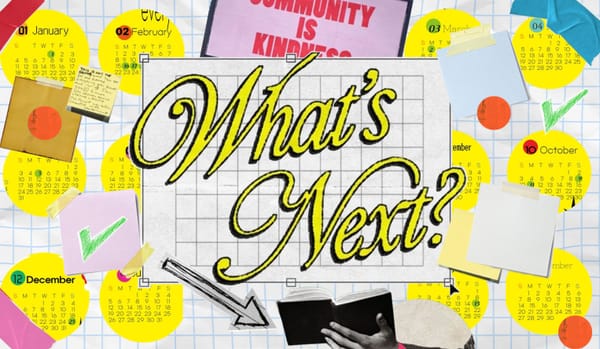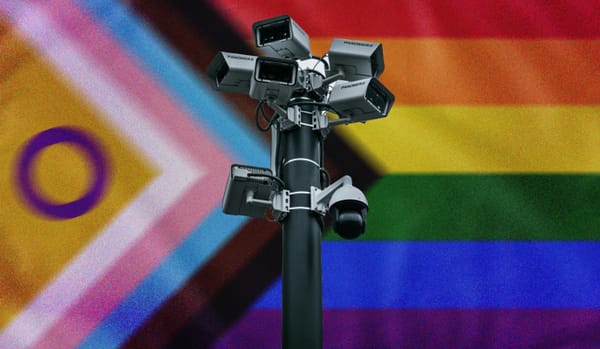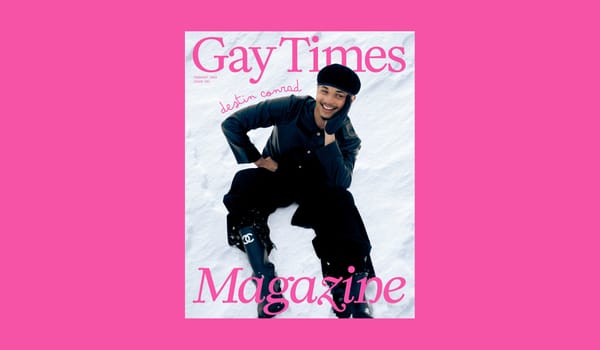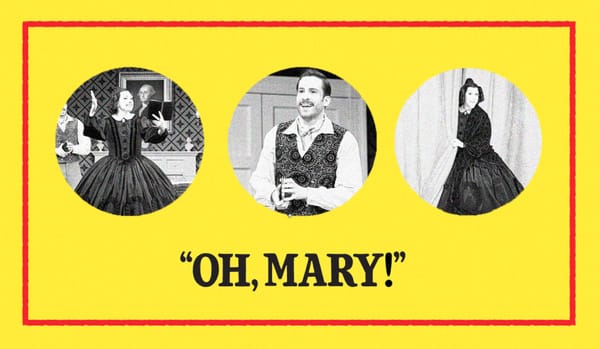SISSY: Must women always initiate the invitation to be pursued?
In the first instalment of her new monthly column for Gay Times, writer P. Eldridge confronts the maddening notion of “posturing” to be desired.
In the first instalment of her new monthly column for Gay Times, writer P. Eldridge confronts the maddening notion of “posturing” to be desired.
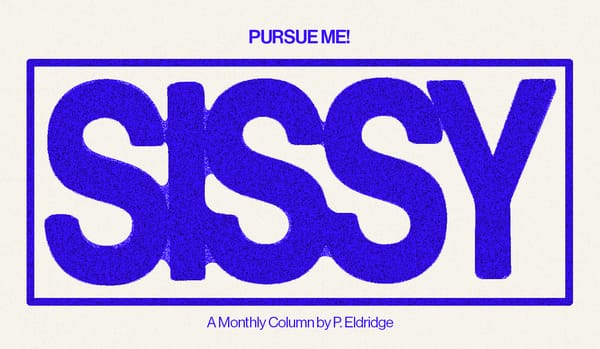
Words P. Eldridge
I’m in the kitchen making mousse, listening to ‘Leave (Get Out)’ by JoJo, punctuating my lyrical screams with the word “posturing.” I have a box of Palestinian dates, three blocks of dark chocolate, a tray of strawberries, salt and olive oil for garnish, and almond milk simmering gently. The word rolls around my tongue – what the fuck does it even mean, and why am I so obsessed with it?
I start prepping the dates, carefully pitting them with a knife, making sure my slicing is steady so I don’t cut into my long acrylic talons. My fingers are sticky – sickly sweet – so I suck the ends of my claws. I taste good.
A moment ago, I was lying on the couch, doomscrolling, when I landed on a video of some podcaster bloke claiming that “ugly” women are more likely to have boyfriends because of their posturing – for love, affection, or sexual attention. I’m appalled. Firstly, because I think he’s an idiot. Secondly, because I’m uncomfortable with the implication that I’m not trying hard enough. The clip ends with the sentiment that pretty women fail to posture effectively for men because they’re beautiful – they don’t need to try. They think so highly of themselves they forget men need encouragement to make a move, to feel safe enough to approach. The outcome being: if you don’t make it glaringly obvious to a man that you’re available – that you’re keen – how is he supposed to know you want him? “Posturing helps show a man you want it.” What it is, exactly, goes unexplained.
I haven’t thought about having a boyfriend in over a year. The last person I dated was, as my friends would say, a dickhead. Though I’m not sure it’s that simple. He was emotionally unsatisfying – a textbook example of a man nearing thirty with no sense of direction. In a band, bad boy, doing coke in the loos of shitty pubs. Mutton chops (which I loved, obviously). The total opposite of me – star-crossed, unrequited, maybe, though we tried to make it work. I’m reflecting on him now not for self-flagellation, not to perform woe is me for an audience, but to recognise that amidst all his disarray, he never made me posture for his attention.
We met in the dimly lit recesses of a dating app – both our sets of pictures quasi-cute, but undeniably lonely. Most of mine were just of my great arse; most of his showed him performing on stage. He was delicate over text – honestly really sweet with me – and seemed genuinely interested in every passing thought I had. It was endearing. He had a slew of questions, which felt like a good sign, and when we finally met, I didn’t need to do much before he was asking – politely – if he was allowed to kiss me.
I fell into a kind of infatuated daze with him, dozing off beside him at midday, after great sex. When we finally dragged ourselves out of bed, led by hunger into the street, I’d throw on a hoodie and jeans because he told me I looked hot in my casual garb. One morning, when he helped me get dressed, he pulled from my wardrobe the most rancid vest I’d ever convinced myself was flattering – and when I put it on, he practically couldn’t keep his hands off me. With him, all the things I second-guessed about myself seemed to vanish. Even when I caught myself comparing myself to other women, the ones with their hair slicked back, perfectly applied makeup, gorgeously smooth, shaved legs... it didn’t seem to matter. Not to him.
I can’t help but think – was this posturing too? Effortless, casual girl with untamed curls dates the guy who likes her unkempt. A low-maintenance fantasy. I wasn’t pretending, but I knew what I was doing. Letting him believe he’d found something natural, easy. Like desire just happened.
I went to one of his gigs with a friend, dragging her along despite her complaints about going in the first place. I’d assured her it would be fun, though when we arrived, it was obvious he was already dissociating. His eyes were bloodshot, pupils dilated, with that hollow, jittery stare that said the drugs had landed before we did. I slipped off to the bathroom – not to check how I looked, but to scrub the enthusiasm from my personhood. Though I’m sober, I can usually rise to the occasion when chaos is thick in the air and love is fragrancing the edges of my being. I’m affable, affectionate – I know how to mould my face into that soft, receptive shape, the one that offers sex as a reward for attention, telegraphed quietly behind the eyes. But tonight, equal parts embarrassed and exasperated by his scattered, unaffectionate behaviour, I committed to glaring – half-heartedly, but with purpose.
I un-postured myself – neutralised my behaviour – letting the fatigue settle in as I realised I’d made yet another grave mistake. Another poor choice in who I was dating. Worse, that I was still stuck in my old habits, still drawing in subpar men like clockwork. Hfft. I was introduced to a few of his friends – briefly. Just quick, passing encounters. I couldn’t bear to leave my friend to fend off some sweaty man leaning over her, and besides, I could feel the flame of desire quietly leaving my body.
I consciously made the decision to reduce my feminine appeal – shrinking myself, dampening that flickering confidence in my own desirability. I adopted a body language, a set of gestures and movements, that screamed: Fuck, get me out of here. Or, as JoJo serenades me now, “Get out (leave)”! Even in that slump, as I pushed my way to the front of the bar for a cola – to save both my fraying mind and my friend with sugar – he slinked up behind me, grabbed my waist, and flashed his massive phone in my face. The text on the screen read: “She’s so fucking hot dude, you scored big time.”
I drain the dates from the hot water and add them, along with the chocolate and almond milk, to the blender. I hit the switch and, mid-whir, Google the etiquette of posturing. The blades roar, disintegrating everything into a thick, chocolatey mass. The headline that catches my eye reads: “The Importance of Authenticity.” I click the link. The first line I read says: “It's essential to approach posturing not as a means of conforming to stereotypes, but as a way to express one's authentic self.” I blink at the sentence on the screen, letting the words settle somewhere behind my eyes. Posturing as authenticity. What a contradiction. Or maybe not. Maybe it’s the only thing that makes sense anymore – presenting curated versions of yourself not to deceive, but to gesture. To gesture truthfully. A body language of longing, a subtle lean toward wanting.
I pour the mousse into tiny glass pots and lick the spoon, still thinking about the word, still chewing on it like a piece of overworked gum. Maybe it’s less about pretending and more about permission – about giving others the green light to meet you halfway. Maybe posturing isn’t the performance; maybe the performance is pretending you don’t care at all.
I think back to all the times I have postured – whether I knew it or not. The way I played it cool when I wanted to be cherished. The slow blink across the room at someone I wanted to touch me like I was rare. The time I wore sheer tights through winter’s teeth, hips swinging like I had fire where others froze.. It wasn’t dishonest. It was me, cracked open. Then there’s the other kind – the posturing that’s not for you but for survival. In a room full of men who treat your body like a punchline, sometimes you put the mask on because the alternative is being ignored, or worse, devoured. It’s exhausting. No mousse in the world can offset the kind of tired that comes from being seen in all the wrong ways. But still, I can’t shake that line: a way to express one’s authentic self. What would it mean to posture not to attract attention, but to offer clarity? To say, without begging or pleading, here I am – and mean it?
I’m circling back to that video, the smug podcaster and his deeply average face, declaring that we ought to dangle ourselves like bait to make men feel “safe” enough to pursue. I didn’t realise safety was my responsibility. I didn’t realise my desirability came with a list of terms and conditions. Be beautiful, but not too aware of it. Be inviting, but don’t initiate. Be soft, but not needy. Be confident, but defer to their insecurities. The question wriggles at the base of my skull: Must women always initiate the invitation to be pursued? That’s what the video is really suggesting. That we must frame ourselves just right – available but mysterious, sexy but modest, chill but deeply interested – so that a man feels brave enough to approach. It’s like being a lighthouse with a perfect dimmer switch. Shine enough to guide, but not to blind.
I’m reminded of that night at the gig, when I let myself collapse into something shapeless, something deliberately dull. It wasn’t rebellion; it was retreat. A refusal to posture because I couldn’t bear to be read at all. Not by him, not like that. I think my body knew before I did, that to posture for someone who sees you only as a prize is not seduction – it’s surrender.
The cruel irony is, when I took the performance of desirability away, it seemed he wanted me more. Which highlights a fundamental flaw in the podcaster’s theory when held in tension with the idea of authenticity. Because what does it mean to try hard enough in dating? Who decides when effort becomes desperation, or when nonchalance tips into disinterest?
Sometimes I wonder if I’m performing even when I think I’m not – when I say I’m “just being myself,” is that self untouched by performance, or simply a more refined act I’ve rehearsed too well to notice?
The line between authenticity and strategy gets blurrier the more I try to locate it. I catch myself asking: am I desirable because I’ve made myself easy to want, or because I’ve learned to hide the effort it takes to be wanted at all? If I am trying – if I’m curating softness, playing down my knowing – does that make the connection less real? Or just more survivable?
***
P. Eldridge is a curator, writer, and cultural agitator working between London and so-called Australia. Her practice is a soft weapon, a sharp tenderness carving space for queer embodiment, defiance, and reimagined ways of living.
As a contributor to Gay Times Magazine, she invites readers into a reflective exploration through the intricacies of modern love and the tender unfolding of personal growth. Here, she introduces her new column, SISSY, that delves into the complexities of gender, sexuality, and subverts societal expectations on identity and love. @pierceeldridge
